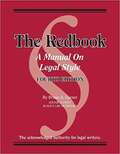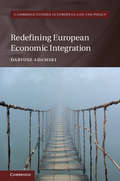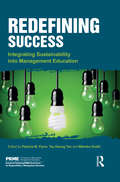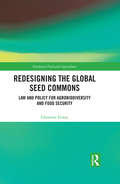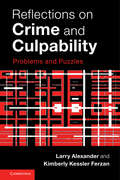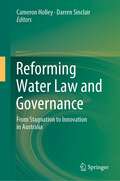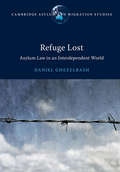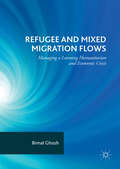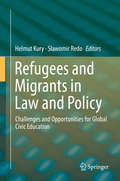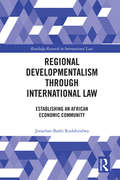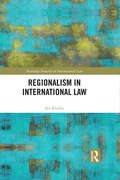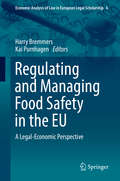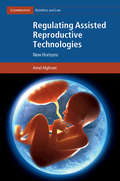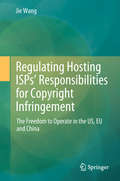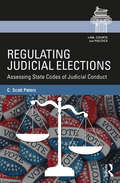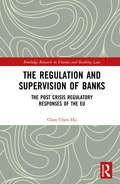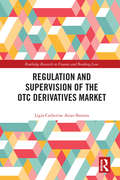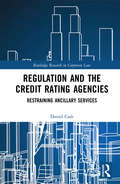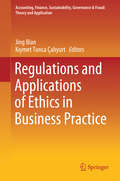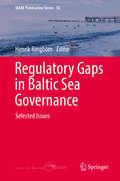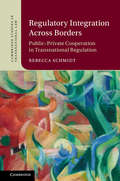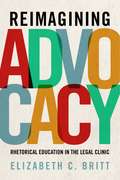- Table View
- List View
The Redbook: A Manual on Legal Style
by Bryan GarnerBryan A. Garner's Redbook: A Manual on Legal Style, 4th Edition (Coursebook)
Redefining European Economic Integration (Cambridge Studies In European Law And Policy)
by Dariusz AdamskiEuropean economic integration has relied on policies intended to make the European Union strong and resilient economically, socially and politically. The Eurozone crisis and Brexit have demonstrated, however, how fragile this hope was and how contested reforms to the major European economic policies have become.<P><P> Dariusz Adamski explains the evolution of these policies - from the Economic and Monetary Union to the internal market, international trade, the EU's climate policy, as well as its redistributive policies - and demonstrates how this evolution has made European economic integration increasingly frail. He shows how erroneous economic and political assumptions regarding the direction of the European integration project have interplayed with the EU's constitutional context. Arguing that flaws in individual policies contributing to European economic integration can be remedied in compliance with the existing constitutional setup, he explains why such solutions would be economically beneficial and politically feasible.<P> Demonstrates the relationship between national policies and the travails of European economic integration.<P> Explains which economic and political theories are useful in understanding the current state of European integration and which can serve as guidelines for reforming it.<P> Will appeal to readers with backgrounds in EU law, economics and politics alike.
Redefining Success: Integrating Sustainability into Management Education (The Principles for Responsible Management Education Series)
by Patricia M. Flynn Tay Keong Tan Milenko GudićRedefining Success: Integrating Sustainability into Management Education advocates incorporating sustainability concepts that go beyond the financial ‘bottom line’ into management education and business practice. Highlighting the UN Global Compact (UNGC), the Principles for Responsible Management Education (PRME) and the Sustainability Development Goals (SDGs), it explores conceptual and practical issues, presents case studies and other empirical evidence, and offers solutions that will both encourage and assist management educators in the incorporation of sustainability into their courses and research. incorporating sustainability into their courses and research. Written by 34 individuals from 17 countries, the book addresses these topics from a variety of theoretical, disciplinary, geographic and organizational perspectives. The authors demonstrate how management educators, collaborating with business and civic organizations, can be change agents for a better world. Written for educators, scholars and business practitioners, the volume concludes with lessons learned, challenges encountered, and implications for responsible management education.
Redesigning the Global Seed Commons: Law and Policy for Agrobiodiversity and Food Security (Earthscan Food and Agriculture)
by Christine FrisonThere is much current controversy over whether the rights to seeds or plant genetic resources should be owned by the private sector or be common property. This book addresses the legal and policy aspects of the multilateral seed management regime. First, it studies in detail the International Treaty on Plant Genetic Resources for Food and Agriculture (the Treaty) in order to understand and identify its dysfunctions. Second, it proposes solutions - using recent developments of the "theory of the commons" - to improve the collective seed management system of the Treaty, a necessary condition for its member states to reach the overall food security and sustainable agriculture goals. Redesigning the Global Seed Commons provides a significant contribution to the current political and academic debates on agrobiodiversity law and governance, and on food security and food sovereignty, by analyzing key issues under the Treaty that affect the design and implementation of regulatory instruments managing seeds as a commons. It also examines the practical, legal, political and economic problems encountered in the attempt to implement these obligations in contemporary settings. In particular, it considers how to improve the Treaty implementation by proposing ways for Contracting Parties to better reach the Treaty’s objectives taking a holistic view of the human-seed ecosystem. Following the tenth anniversary of the functioning the Treaty’s multilateral system of access and benefit-sharing, which is currently under review by its Contracting Parties, this book is well-timed to examine recent developments in the field and guide the current review process to design a truly Global Seed Commons.
Reflections on Crime and Culpability: Problems and Puzzles
by Larry Alexander Kimberly Kessler FerzanIn 2009, Larry Alexander and Kimberly Ferzan published Crime and Culpability: A Theory of Criminal Law. The book set out a theory that those who deserve punishment should receive punishment commensurate with, but no greater than, that which they deserve. Reflections on Crime and Culpability: Problems and Puzzles expands on their innovative ideas on the application of punishment in criminal law. Theorists working in criminal law theory presuppose or ignore puzzles that lurk beneath the surface. Now those who wish to examine these topics will have one monograph that combines the disparate puzzles in criminal law through a unified approach to culpability. Along with some suggestions as to how they might resolve the puzzles, Alexander and Ferzan lay out the arguments and analysis so future scholars can engage with questions about our understanding of culpability that very few have addressed.
Reflections on Life
by Alexis CarrelIn this present volume, the author of Man the Unknown makes clear why civilisation is on the edge of an abyss and propounds three basic laws of nature in which, he believes, lies mankind’s only salvation: Effects of Chemical Factors, Effects of Physical Factors, and Effects of Physiological Habits.
Reforming Water Law and Governance: From Stagnation To Innovation In Australia
by Cameron Holley Darren SinclairThis book identifies the most effective water policy tools and innovations, and the circumstances that foster their successful implementation by taking a comparative look at a world-leading ‘laboratory’ of water law and governance: Australia. In particular, the book analyses Australia’s 20-year experience implementing a hybrid governance system of markets, hierarchical regulation, and collaborative integrated water planning. Australia is acknowledged as a world leader in water governance reform, and an examination of its relatively mature water law and governance system has great significance for many international academics and jurisdictions. This book synthesises practical lessons and theoretical insights from Australia, as well as recommendations from comparative analysis with countries such as the United States to provide useful guidance for policymakers and scholars seeking to apply water instruments in a wide range of policy contexts. The book also advances our understanding of water and broader environmental governance theory and is a valuable reference for scholars, researchers and students working in law, regulation and governance studies – especially in the field of water and environmental law.
Refuge Lost: Asylum Law in an Interdependent World (Cambridge Asylum and Migration Studies)
by Daniel GhezelbashAs Europe deals with a so-called 'refugee crisis', Australia's harsh border control policies have been suggested as a possible model for Europe to copy. Key measures of this system such as long-term mandatory detention, intercepting and turning boats around at sea, and the extraterritorial processing of asylum claims were actually used in the United States long before they were adopted in Australia. The book examines the process through which these policies spread between the United States and Australia and the way the courts in each jurisdiction have dealt with the measures. Daniel Ghezelbash's innovative interdisciplinary analysis shows how policies and practices that 'work' in one country might not work in another. This timely book is a must-read for those interested in preserving the institution of asylum in a volatile international and domestic political climate.
Refugee and Mixed Migration Flows: Managing a Looming Humanitarian and Economic Crisis
by Bimal GhoshThis book provides an insightful analysis of the looming refugee and mixed migration crisis in the context of four major, contemporary flows: two in west and east Europe, and one each in the Americas and Asia. The analysis, in each case, is followed by a judicious identification of the key issues involved and the presentation of a set of proposed policy responses to them. The discussion is then placed in a global setting and dovetailed with the recently launched United Nations initiative to adopt global compacts on refugees and migrants. The author brings to this book, the first of its kind, his vast experience of advising, and actively engaging with, many of the principal international organisations concerned with refugee and migration issues. This book will be of interest to researchers, students, NGOs, professional bodies, national ministries, international organisations and rights groups in the fields of economics, public finance, political economy, human rights and refugee law, and international relations and demography.
Refugees and Migrants in Law and Policy: Challenges And Opportunities For Global Civic Education
by Helmut Kury Sławomir RedoRefugees and migration are not a new story in the history of humankind, but in the last few years, against a backdrop of huge numbers of migrants, especially from war-torn countries, they have again been a topic of intensive and contentious discussion in politics, the media and scientific publications. Two United Nations framework declarations on the sustainable development goals and on refugees and migrants adopted in 2016 have prompted the editors – who have a background in international criminology – to invite 60 contributors from different countries to contribute their expertise on civic education aspects of the refugee and migrant crisis in the Global North and South. Comprising 35 articles, this book presents an overview of the interdisciplinary issues involved in irregular migration around the world. It is intended for educationists, educators, diplomats, those working in mass media, decision-makers, criminologists and other specialists faced with questions involving refugees and migrants as well as those interested in improving the prospects of orderly, safe, regular and responsible migration in the context of promoting peaceful and inclusive societies for sustainable development. Rather than a timeline for migration policies based on “now”, with states focusing on “stopping migration now”, “sending back migrants now” or “bringing in technicians or low-skilled migrant workers now”, there should be a long-term strategy for multicultural integration and economic assimilation. This book, prefaced by François Crépeau, the United Nations Special Rapporteur on the human rights of migrants, and William Lacy Swing, Director-General of the International Organization for Migration, addresses the question of the rights and responsibilities involved in migration from the academic and practical perspectives of experts in the field of social sciences and welfare, and charts the way forward to 2030 and beyond, and also beyond the paradigm of political correctness.
Regional Developmentalism through Law: Establishing an African Economic Community (Routledge Research in International Law)
by Jonathan Bashi RudahindwaOffering a study of regionalism in Africa and investigating the ways in which law can be used to address the issues raised by regional processes on the continent, this book examines the African Economic Community, considering that it has been entrusted to coordinate and to harmonize policies between various Regional Economic Communities (RECs) across the continent, thereby influencing the continent’s approach towards regional integration. It seeks to identify how law can be used to strengthen the African RECs while ensuring that they achieve their goal of promoting regional development across the continent. Drawing upon economic and political theories, and using a critical doctrinal analysis of legal texts and norms, the book uncovers the legal and economic underpinnings of the model of regional integration followed by the regional schemes operating under the banner of the AEC, aiming to contribute to the search for effective methods to ensure the success of these various initiatives. Proposing the concept of "Regional Developmentalism Through Law" as the most suitable conceptual framework to support the effective establishment of an African Economic Community, this book will be of interest to researchers, academics and policy makers interested in the correlation between law, regional integration and development in Africa.
Regionalism in International Law (Routledge Research in International Law)
by Ján KlučkaInternational Law: Aspects of Regionalism evaluates regionalism in its various relationships and forms with respect to international law, as well as the importance and duties of international law in respect to the establishment and functioning of various forms of regional groups. A great deal of attention has been paid to regionalism from the global, political, ecocomic, security aspects, but a complex evaluation of the impact it has had on international law, and vice versa, is still lacking. The main purpose of this volume is to eliminate this gap and present the latest state of knowledge on the topic. This text will be of interest both to students at an advanced level, academics, and reflective practitioners. It addresses the topics with regard to international law and regionalism and will be of interest to academics dealing with legal aspects of current regionalism and for the specialized courses in the faculties of law, as well as anyone studying diplomacy and international studies, international relations, regional integration law, EU law, international law, and international relations.
Regulating and Managing Food Safety in the EU: A Legal-Economic Perspective (Economic Analysis of Law in European Legal Scholarship #6)
by Harry Bremmers Kai PurnhagenThis book analyses EU food law from a regulatory, economic and managerial perspective. It presents an economic assessment of strategies of food safety regulation, and discusses the different regulatory regimes in EU food law. It examines the challenges of food safety in the internal market as well as the regulatory tools that are available. The book’s generic theorising and measurement of regulatory effects is supplemented by detailed analysis of key topics in food markets, such as health claims, enforcement strategies, and induced risk management at the level of the organizations producing food. The regulatory effects discussed in the book range from classical regulatory analysis covering e.g. effects of ex-ante versus ex-post regulation and content-related versus information-related regulation to new regulatory options such as behavioral regulation. The book takes as its premise the idea that economic considerations are basic to the design and functioning of the European food supply arena, and that economic effects consolidate or induce modification of the present legal structures and principles. The assessments, analyses and examination of the various issues presented in the book serve to answer the question of how economic theory and practice can explain and enhance the shaping and modification of the regulatory framework that fosters safe and sustainable food supply chains.
Regulating Assisted Reproductive Technologies: New Horizons (Cambridge Bioethics and Law)
by Amel AlghraniReproductive science continues to revolutionise reproduction and propel us further into uncharted territories. The revolution signalled by the birth of Louise Brown after IVF in 1978, prompted governments across Europe and beyond into regulatory action. Forty years on, there are now dramatic and controversial developments in new reproductive technologies. Technologies such as uterus transplantation that may enable unisex gestation and babies gestated by dad; or artificial wombs that will completely divorce reproduction from the human body and allow babies to be gestated by machines, usher in a different set of legal, ethical and social questions to those that arose from IVF. This book revisits the regulation of assisted reproduction and advances the debate on from the now much-discussed issues that arose from IVF, offering a critical analysis of the regulatory challenges raised by new reproductive technologies on the horizon.
Regulating Hosting ISPs’ Responsibilities for Copyright Infringement: The Freedom to Operate in the US, EU and China
by Jie WangThis book employs a comparative approach to comprehensively discuss hosting ISPs’ (Internet Service Providers') responsibilities for copyright infringement in the US, EU and China. In particular, it details how the current responsibility rules should be interpreted or revised so as to provide hosting ISPs maximum freedom to operate in these jurisdictions. In addition to examining relevant state regulations, the book assesses self-regulation norms agreed upon between copyright owners and hosting ISPs, and concludes that self-regulation is better suited to preserving hosting ISPs’ freedom to operate. The results of this study will be interesting for a broad readership, including academics and practitioners whose work involves hosting ISPs’ copyright responsibilities.
Regulating Investor Protection under EU Law: The Unbridgeable Gaps with the U.S. and the Way Forward
by Antonio MarcacciThis book analyzes the legal system for the protection of retail investors under the European Union law of investment services. It identifies the regulatory leitmotiv driving the EU lawmaker and ascertains whether and to what extent such a system is self-sufficient, using a set of EU-made and EU-enforced rules that is essentially different and autonomous from the domestic legal orders. In this regard, the book takes a double perspective: comparative and intra-firm. Given the federal dimension of the US legal system and, thus, the “role-model” it plays vis-à-vis the EU, the book compares the two systems. To fully highlight the existing gaps and measure how self-sufficient the EU system is against its American counterpart, the Union/Federal level as such is analyzed – i.e., detached from the national (in EU terms) and State (in US terms) level. Regulating Investor Protection under EU Law also showcases the unique intra-firm perspective from a European investment firm and analyzes how EU-produced public-law rules become a set of compliance requirements for investment services providers. This “within-the-firm” angle gauges the self-sufficiency of the EU system of retail investor protection from the standpoint of an EU-regulated entity. The book is intended for both compliance professionals and academic scholars interested in this topic while also including illustrative sections intended to provide a broader regulatory view for less-experienced readers.
Regulating Judicial Elections: Assessing State Codes of Judicial Conduct (Law, Courts and Politics)
by C. Scott PetersState judicial elections are governed by a unique set of rules that enforce longstanding norms of judicial independence by limiting how judicial candidates campaign. These rules have been a key part of recent debates over judicial elections and have been the subject of several U.S. Supreme Court cases. Regulating Judicial Elections provides the first accounting of the efficacy and consequences of such rules. C. Scott Peters re-frames debates over judicial elections by shifting away from all-or-nothing claims about threats to judicial independence and focusing instead on the trade-offs inherent in our checks and balances system. In doing so, he is able to examine the costs and benefits of state ethical restrictions. Peters finds that while some parts of state codes of conduct achieve their desired goals, others may backfire and increase the politicization of judicial elections. Moreover, modest gains in the protection of independence come at the expense of the effectiveness of elections as accountability mechanisms. These empirical findings will inform ongoing normative debates about judicial elections.
The Regulation and Supervision of Banks: The Post Crisis Regulatory Responses of the EU (Routledge Research in Finance and Banking Law)
by Chen Chen HuOver the past two decades, the banking industry has expanded and consolidated at a stunningly unprecedented speed. In this time banks have also moved from focusing purely on commercial banking activities to being heavily involved in market-based and transaction-oriented wholesale and investment banking activities. By carrying out an all-encompassing set of activities, banks have become large, complex, interconnected, and inclined to levels of risk-taking not previously seen. With the onset of the 2008 global financial crisis it became apparent that there was an issue of institutions being too big to fail. This book analyses the too-big-to-fail problem of banks in the EU. It approaches the topic from an interdisciplinary perspective using behavioural finance as a tool to examine the occurrence of the global financial crisis and the emergence of the structural problem in large banking institutions. The book draws a comparison between the EU, the US and the UK and the relevant rules to assess the effectiveness of various approaches to regulation in a global context. Chen Chen Hu goes on to use behavioural analyses to provide new insights in evaluating the current structural reform rules in the EU Proposal on Bank Structural Regulation and the newly adopted bank recovery and resolution regime in the EU Bank Recovery and Resolution Directive and the Single Resolution Mechanism (SRM) in the Single Resolution Regulation.
Regulation and Supervision of the OTC Derivatives Market (Routledge Research in Finance and Banking Law)
by Ligia Catherine Arias-BarreraThe over-the-counter (OTC) derivatives market has captured the attention of regulators after the Global Financial Crisis due to the risk it poses to financial stability. Under the post-crisis regulatory reform the concentration of business, and risks, among a few major players is changed by the concentration of a large portion of transactions in the new market infrastructures, the Central Counterparties (CCPs). This book, for the first time, analyses the regulatory response of the United Kingdom and the United States, the two largest centres of OTC derivatives transactions, and highlights their shortcomings. The book uses a normative risk-based approach to regulation as a methodological lens to analyse the UK regime of CCPs in the OTC derivatives market. It specifically focuses on prudential supervision and conduct of business rules governing OTC derivatives transactions and the move towards enhancing the use of central clearing. The resulting analysis, from a normative risk based approach, suggests that the UK regime for CCPs does not fulfil what would be expected if a coherent risk based approach was taken. Our comments on the Dodd-Frank Act highlight that the incoherent adoption of risk-based approach to regulation affects the effectiveness of the US regime for CCPs. Such a regime does not follow the pace of events of ‘innovation risk’; in particular, the foreseeable changes FinTech will bring to the OTCDM and central clearing services. The second inadequacy of the US regime concerns the dual regulatory structure of the CFTC and the SEC, and the inadequate adoption of different and not well-coordinated regulatory strategies. We also analyse the cross-border implications of the US regime for non-US CCPs that provide clearing services to US market participants. Finally, we study the negative effects of the absence of a clearly defined resolution regime for CCPs.
Regulation and the Credit Rating Agencies: Restraining Ancillary Services (Routledge Research in Corporate Law)
by Daniel CashThis book examines the transgressions of the credit rating agencies before, during and after the recent financial crisis. It proposes that by restricting the agencies’ ability to offer ancillary services there stands the opportunity to limit, in an achievable and practical manner, the potentially negative effect that the Big Three rating agencies – Standard & Poor’s, Moody’s and Fitch – may have upon the financial sector and society moreover. The book contains an extensive and in-depth discussion about how the agencies ascended to their current position, why they were able to do so and ultimately their behaviour once their position was cemented. This work offers a new framework for the reader to follow, suggesting that investors, issuers and the state have a ‘desired’ version of the agencies in their thinking and operate upon that basis when, in fact, those imagined agencies do not exist, as demonstrated by the ‘actual’ conduct of the agencies. The book primarily aims to uncover this divergence and reveal the ‘real’ credit rating agencies, and then on that basis propose a real and potentially achievable reform to limit the negative effects that result from poor performance in this Industry. It addresses the topics with regard to financial regulation and the financial crisis, and will be of interest to legal scholars interested in the intersection between business and he law as well as researchers, academics, policymakers, industry and professional associations and students in the fields of corporate law, banking and finance law, financial regulation, corporate governance and corporate finance.
The Regulation of the London Clearing Banks, 1946–1971: Stability And Compliance (Palgrave Studies in Economic History)
by Linda ArchThis book explores the way in which banks were regulated in the UK in the period from 1946 until 1971. It focuses upon a group of 11 banks known as the London clearing banks. These banks included the ‘Big Five’ – Barclays, Lloyds, Midland, National Provincial and Westminster – and were the equivalent to today’s retail banks.The time period in question is an intriguing one in the history of banking and bank regulation in that the banking system was very stable, but the regulatory framework was less dependent upon codified forms of regulation than it is today. Having explored the nature of clearing bank regulation, Arch goes on to consider the rationale behind it, as well as its consequences. She concludes by reflecting upon the nature of bank regulation since the global financial crisis. This title is essential reading for academics with an interest in banking history and bank regulation, for practicing bank regulators and for regulatory policymakers.
Regulations and Applications of Ethics in Business Practice (Accounting, Finance, Sustainability, Governance & Fraud: Theory and Application)
by Jing Bian Kıymet Tunca ÇalıyurtThis book presents a variety of discussions from different countries about regulations and applications of ethics in business practice. It demonstrates how Ethics, both in the world of business and in academic life, is consistently a central and unavoidable issue that institutions must devise new regulations on a regular basis to address. Given that applying such regulations becomes complicated in a global business landscape and that International companies have lost large amounts of revenues due to fraudulent activities, the book provides insights for professionals in business world to teach, learn, apply, measure and report on companies' daily business. Business and Professional Ethics: Theories, Standards, and Analysis is essential reading for researchers and students in business schools around the world.
Regulatory Gaps in Baltic Sea Governance: Selected Issues (Mare Publication Ser. #18)
by Henrik RingbomThe focus of this publication is the uniqueness of the Baltic Sea from a legal perspective, and the regulatory voids that result from the multiple layers of regulation this area is subjected to: up to six layers of regulation (general international law, regional conventions, EU law, national laws, local and municipal rules plus a whole range of non-binding norms and other 'soft law' arrangements) act in parallel. However, a large number of rules or regulatory layers does not in itself ensure effectiveness or consistency. When the regulatory landscape is approached from the point of view of individual substantive topics, it is apparent that the norms of different regulatory layers entail both overlaps, gaps and uncertainties, differently for each topic. This publication addresses a selection of topics that are decidedly international in nature, but for which current international and EU rules include important gaps or uncertainties.In addition to presenting a set of legal analyses of topical issues for the region, which in itself is a meritorious objective in view of the relative scarcity of legal studies with a focus on the Baltic Sea, the publication also seeks to analyze the regulatory 'anatomy' of the selected issues in more detail. Through the legal analyses the chapters explore how regulatory gaps are formed, how they are filled, how the rules of the different layers work together and interact with each other in the selected areas. Accordingly, the secondary ambition is to explore, through the chapters, whether more general conclusions can be drawn about the nature of the regulatory gaps and multi-layerism in order to produce a better understanding of how regulations on multiple levels operate in practice.
Regulatory Integration Across Borders: Public–Private Cooperation in Transnational Regulation (Cambridge Studies in Transnational Law)
by Rebecca SchmidtThis book deals with a key feature of globalization: the rise of regulation beyond the state. It examines the emergence of transnational regulatory cooperation between public and private actors and pursues an inquiry that is at once legal, empirical and theoretical. It asks why a private actor and an international organization would regulate cooperatively and what this tells us about the material meaning of concepts such as 'expertise', 'authority' and 'legitimacy' in specific domains of global governance. Additionally, the book addresses the structures and patterns in which cooperation evolves and how this affects the broader global order. It does so through an investigation of two public-private cooperative agreements: one between the International Standards Organization, the Organisation for Economic Co-operation and Development, the Global Compact and the International Labor Organization and one between the International Olympic Committee and the United Nations Environment Programme.
Reimagining Advocacy: Rhetorical Education in the Legal Clinic (RSA Series in Transdisciplinary Rhetoric #8)
by Elizabeth C. BrittDomestic violence accounts for approximately one-fifth of all violent crime in the United States and is among the most difficult issues confronting professionals in the legal and criminal justice systems. In this volume, Elizabeth Britt argues that learning embodied advocacy—a practice that results from an expanded understanding of expertise based on lived experience—and adopting it in legal settings can directly and tangibly help victims of abuse.Focusing on clinical legal education at the Domestic Violence Institute at the Northeastern University School of Law, Britt takes a case-study approach to illuminate how challenging the context, aims, and forms of advocacy traditionally embraced in the U.S. legal system produces better support for victims of domestic violence. She analyzes a wide range of materials and practices, including the pedagogy of law school training programs, interviews with advocates, and narratives written by students in the emergency department, and looks closely at the forms of rhetorical education through which students assimilate advocacy practices. By examining how students learn to listen actively to clients and to recognize that clients have the right and ability to make decisions for themselves, Britt shows that rhetorical education can succeed in producing legal professionals with the inclination and capacity to engage others whose values and experiences diverge from their own.By investigating the deep relationship between legal education and rhetorical education, Reimagining Advocacy calls for conversations and action that will improve advocacy for others, especially for victims of domestic violence seeking assistance from legal professionals.
